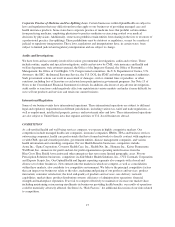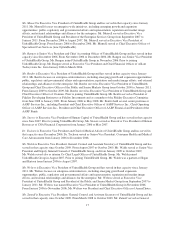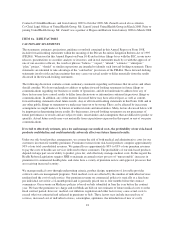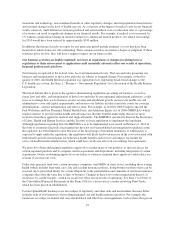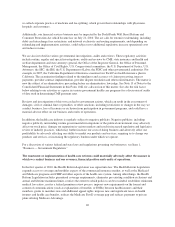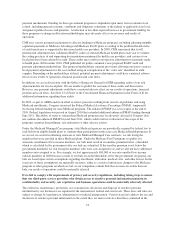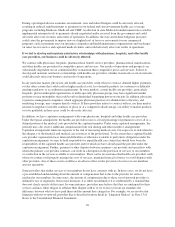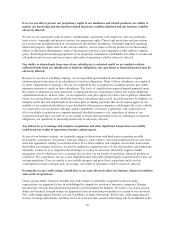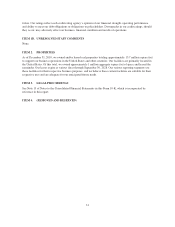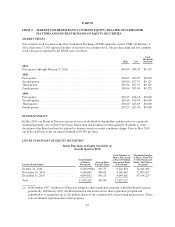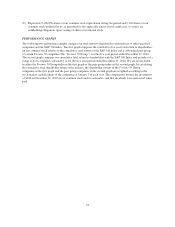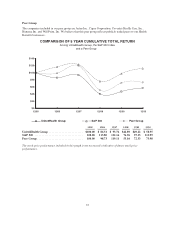United Healthcare 2010 Annual Report Download - page 27
Download and view the complete annual report
Please find page 27 of the 2010 United Healthcare annual report below. You can navigate through the pages in the report by either clicking on the pages listed below, or by using the keyword search tool below to find specific information within the annual report.In addition, our PBM businesses would be adversely affected by an inability to contract on favorable terms with
pharmaceutical manufacturers, and could face potential claims in connection with purported errors by our mail
order or specialty pharmacies, including in connection with the risks inherent in the packaging and distribution of
pharmaceuticals and other health care products. Disruptions at any of our mail order or specialty pharmacies due
to failure of technology or any other failure or disruption to these systems or to the infrastructure due to fire,
electrical outage, natural disaster, acts of terrorism or some other catastrophic event could reduce our ability to
process and dispense prescriptions and provide products and services to customers.
If we fail to compete effectively to maintain or increase our market share, including maintaining or
increasing enrollments in businesses providing health benefits, our results of operations could be
materially adversely affected.
Our businesses compete throughout the United States and face competition in all of the geographic markets in
which we operate. We compete with other companies on the basis of many factors, including price of benefits
offered and cost and risk of alternatives, location and choice of health care providers, quality of customer service,
comprehensiveness of coverage offered, reputation for quality care, financial stability and diversity of product
offerings. For our Health Benefits reporting segment, competitors include Aetna Inc., Cigna Corporation,
Coventry Health Care, Inc., Health Net, Inc., Humana Inc., Kaiser Permanente, WellPoint, Inc., numerous
for-profit and not-for-profit organizations operating under licenses from the Blue Cross Blue Shield Association
and other enterprises that serve more limited geographic areas or market segments such as Medicare specialty
services. For our Prescription Solutions business, competitors include Medco Health Solutions, Inc., CVS/
Caremark Corporation and Express Scripts, Inc. Our OptumHealth and Ingenix reporting segments also compete
with a broad and diverse set of other businesses.
In particular markets, competitors may have greater capabilities, resources or market share; a more established
reputation; superior supplier or health care professional arrangements; existing business relationships; or other
factors that give such competitors a competitive advantage. In addition, significant merger and acquisition
activity has occurred in the industries in which we operate, both as to our competitors and suppliers (including
hospitals, physician groups and other care professionals) in these industries. Consolidation may make it more
difficult for us to retain or increase customers, to improve the terms on which we do business with our suppliers,
or to maintain or advance profitability. If we do not compete effectively in our markets, if we set rates too high or
too low in highly competitive markets, if we do not design and price our products properly and competitively, if
we are unable to innovate and deliver products and services that demonstrate value to our customers, if we do not
provide a satisfactory level of services, if membership or demand for other services does not increase as we
expect, if membership or demand for other services declines, or if we lose accounts with more profitable
products while retaining or increasing membership in accounts with less profitable products, our business and
results of operations could be materially adversely affected.
Adverse economic conditions could adversely affect our revenues and our results of operations.
Adverse economic conditions may continue to impact demand for certain of our products and services. For
example, decreases in employment have caused and could continue to cause lower enrollment in our employer
group plans, lower enrollment in our non-employer individual plans and a higher number of employees opting
out of our employer group plans. Adverse economic conditions have caused and could continue to cause
employers to stop offering certain health care coverage as an employee benefit or elect to offer this coverage on a
voluntary, employee-funded basis as a means to reduce their operating costs. In addition, adverse economic
conditions could continue to negatively impact our employer group renewal prospects and our ability to increase
premiums and could result in cancellation of products and services by our customers. All of these could lead to a
decrease in our membership levels and premium and fee revenues and could adversely affect our results of
operations. In addition, a prolonged adverse economic environment could negatively impact the financial
position of hospitals and other care providers, which could adversely affect our contracted rates with these parties
and increase our medical costs or adversely affect their ability to purchase our service offerings.
25


